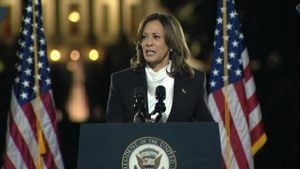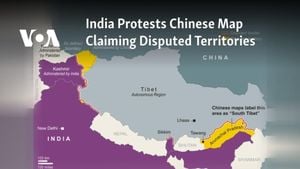Recent skirmishes between Israel and Hezbollah have highlighted the volatile state of affairs along the coastal sector, stirring concerns of escalated conflict. The tensions, rooted deeply in geopolitical struggles, have witnessed increased military posturing from both parties. Recently, Israeli forces conducted military drills, demonstrating readiness to counter any perceived threats from their northern neighbor.
Simultaneously, Hezbollah has been vocal about its discontent, blaming Israel for recent developments and asserting its capability to retaliate. This back-and-forth rhetoric is not new; it reflects longstanding animosities marked by bouts of conflict and sporadic ceasefires.
Analysts note several factors complicate the peace dynamics. Iran's support for Hezbollah remains pivotal, providing the group with significant military resources and strategic backing. Meanwhile, Israel's military intelligence keeps close tabs on Hezbollah's activities, often noting their advances in missile technology.
Hezbollah's military wing has expanded its arsenal over the years, amassing precision-guided missiles capable of reaching major Israeli cities. Such advancements alarm Israeli officials, prompting heightened defensive measures and preemptive strategies.
Despite occasional diplomatic overtures, both sides have seemed to drift toward confrontation more than reconciliation. The fear among many is what might trigger this conflict: a miscalculation during military exercises, border skirmishes, or even domestic political pressures.
On the ground, civilians near the border are caught in the crossfire, experiencing the anxiety of living under the shadow of war. Communities have reported increased military activity, raising alarms over potential escalations.
Further complicacies stem from international involvement, as Western nations often express support for Israel, which could shift power dynamics during times of heightened tension. The United States, known for its strong alliance with Israel, continues to provide military aid and strategic resources.
Meanwhile, Hezbollah remains supported by regional allies who view the group as part of the broader resistance against perceived Western imperialism. This alignment complicates Israel's military strategy as they must account for multi-front engagements.
Historically, the coastal sector has been significant to both sides, involving not only military but also economic interests. The area's rich resources have been at the crux of maritime disputes, leading to additional layers of conflict.
The recent tensions prompt reconsideration of potential pathways to peace. Various analysts are urging both parties to engage more actively in dialogue rather than allowing military might to dictate their interactions. The history between Israel and Hezbollah shows cycles of violence often followed by lulls of negotiations; the question remains whether this pattern will hold.
Looking forward, many are eagerly observing how this situation evolves and what actions international actors may take to defuse tensions. The regional environment remains ever-fluid, and both sides seem to be bracing for whatever the future may hold.



